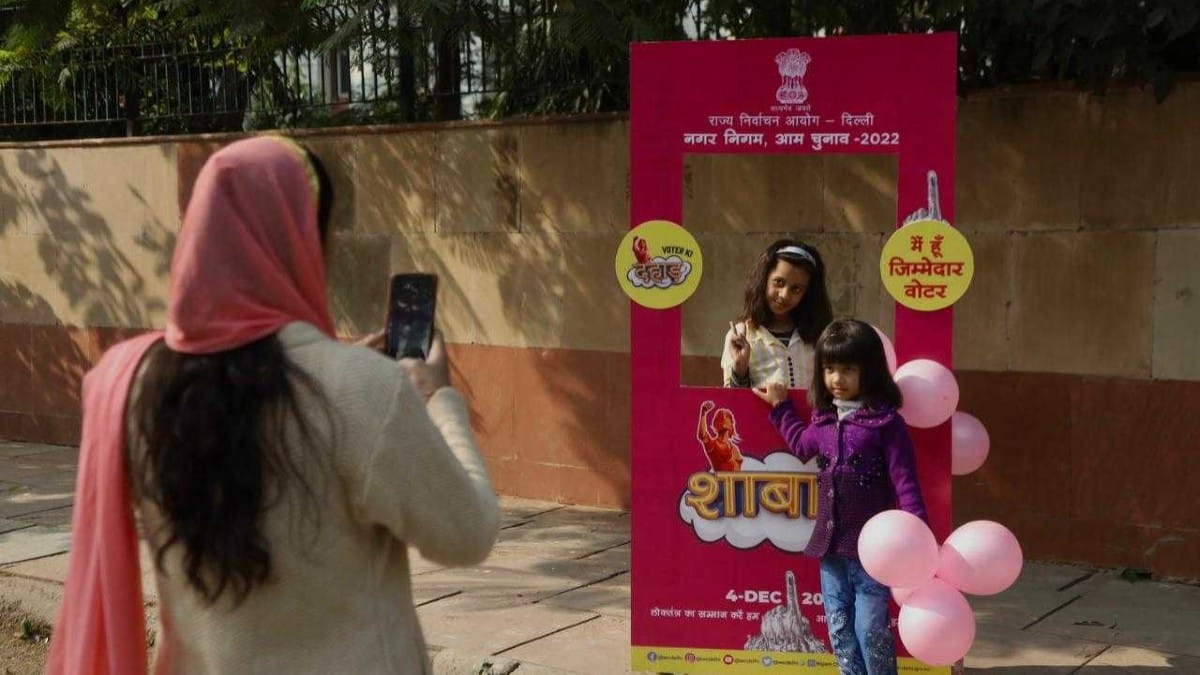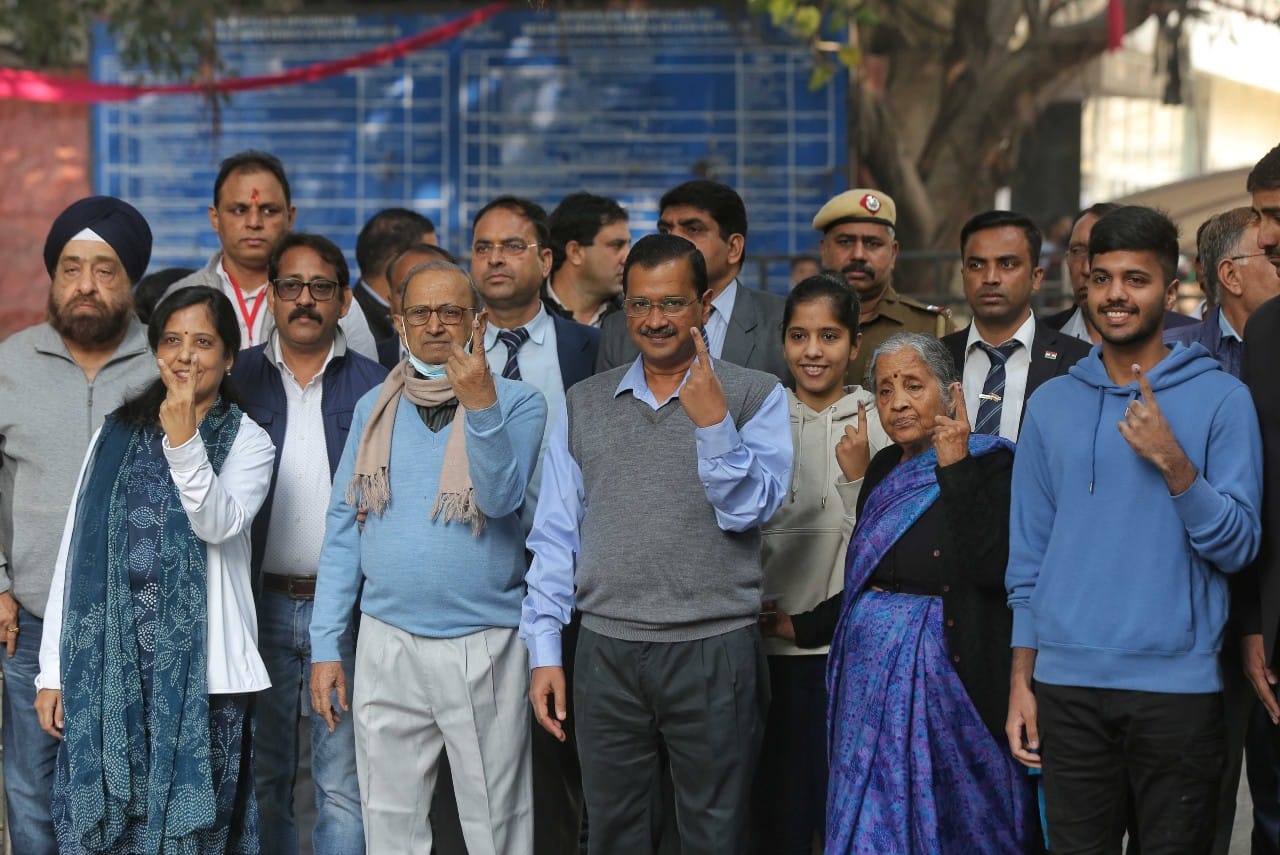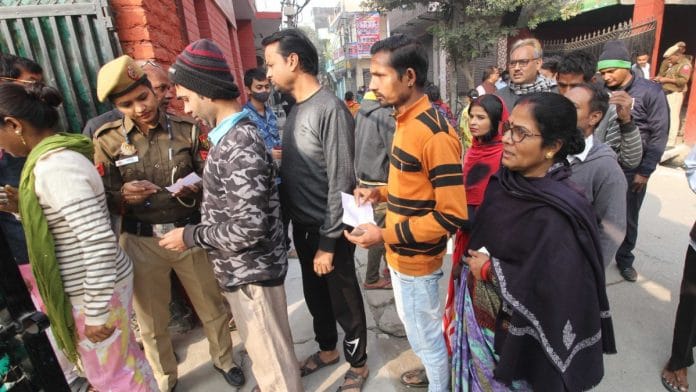New Delhi: On Sunday, Radha Devi and her sister-in-law Seema, both residents of Rouse Avenue, finished their household work earlier than usual before making their way to the Sarvodaya Bal Vidyalaya by 11 am to cast their votes for the Municipal Corporation of Delhi (MCD) elections.
“We came to vote because we want better facilities at our jhuggi (slum). We want that our Dhobi Ghaat should be maintained. We have to go outside for toilets, but we want to get such facilities near us,” said Radha Devi.
The school was one of four ‘Pink Booths’ in Delhi’s Central district managed entirely by women. Decorated with pink balloons to mark its uniqueness, the booth also had a selfie stand where women voters would frequently pose with indelible ink on their finger.

For most women who were stepping out to vote Sunday, cleanliness and basic facilities trumped other issues. Some said they wanted to vote for the party their families had traditionally supported, while others seemed discontent with their councillors over the state of affairs in their wards.
As for parties in the fray, the stakes cannot be higher — this is the first MCD election since the merger of three municipalities by an act of Parliament earlier this year led to the reversal of MCD’s 2012 trifurcation. The campaign for the MCD polls saw an aggressive BJP fighting a prestige battle and an ambitious AAP trying to wrestle control of the civic body.
Shanti Devi, who travelled to the Sarvodaya Bal Vidyalaya in Daryaganj to cast her vote, accompanied by her husband and two daughters, said she would vote for the Bharatiya Janata Party (BJP) since her family had been associated with the party since its Jana Sangh days. “MCD or Vidhan Sabha, it does not matter, we will vote for the party we have been supporting for decades,” she told ThePrint.
While in Old Delhi’s Zeenat Mahal area, a Muslim woman voter said on condition of anonymity that she supports the Aam Aadmi Party (AAP) because not much has improved in her area in terms of cleanliness despite the BJP ruling the MCD for the last 15 years.
For first-time voters like Khushi, the issue of clean washrooms was what prompted her to get out of the house and cast her vote. “I observed what work has been done in my area, and voted on the basis of that. Earlier, public washrooms in our colony used to remain dirty, now the situation has improved a bit and new washrooms were built,” she said.
According to the Election Commission, 45 per cent voter turnout was recorded across Delhi till 4 pm. Voting in 250 wards began at 8 am and continued till 5:30 pm Sunday.
Also Read: Garbage-sewage politics at heart of Delhi MCD poll campaigns as AAP-BJP blamegame continues
‘Freebies’ give edge to AAP
With its long list of star campaigners canvassing for it in parts of Delhi, the BJP trained its guns at the AAP on corruption and ‘revdis’ (freebies). But in Delhi’s slums and unauthorized colonies, CM Arvind Kejriwal’s politics of freebies seem to have given an edge to the AAP going into the election.
In Sarvoday camp in Delhi’s Kalkaji, Mohammad Kalam said free bus travel for women and reduction in electricity and water rates saved him somewhere close to Rs 5,000 per month. Kalam, whose monthly income is Rs 10,000 from a pan shop in the area, added that he is inclined to vote for the AAP.
In Timarpur’s unauthorized colonies, open drains were the biggest concern for voters. For Sarita, a resident of the area, her vote was earmarked for whichever party closes the drains that lay open in front of houses in the area.
“It is an open invitation to disease. Our kids get sick due to the lack of cleanliness. We want these things to get sorted out, otherwise, there is no point of voting for any party,” she said. Adding, “MCD employees come and only clean (open drains) when we give them some money.”
Kejriwal set the tone for the MCD elections with his visit to the Ghazipur landfill in the last week of October. “Ghazipur garbage mound is the mountain of BJP’s bad deeds and corruption in civic bodies. The MCD poll will be fought on the issue of garbage,” he declared.

The BJP was quick to respond, criticizing the AAP over the toxic foam that accumulates atop the Yamuna ahead of Chhath Puja celebrations each year.
Constant friction between the AAP-led Delhi government and BJP-led MCD has resulted in a number of controversies over the last few years.
In its 12-point manifesto, the BJP promised pucca (permanent) houses to slum dwellers, along with facilities such as MCD-operated dispensaries, maternity wards, and schools. The party also roped in several Union ministers and chief ministers — a rare sight for municipal elections — to canvas on its behalf.
The AAP, meanwhile, promised to clean the city and its three landfill sites, resolve parking issues, improve MCD-run schools and hospitals and to give Delhi a corruption-free MCD in its 10-point manifesto, “10 guarantees”.
Delhi has a total of 250 wards, a reduction from 270 after the unification. Of the 270 wards, the BJP had won 181 in 2017, followed by the AAP with 48 and the Congress with 30.
This time around, BJP and AAP sought votes in the name of Prime Minister Narendra Modi and Kejriwal, respectively, the Congress banked on the legacy of former Delhi CM Late Sheila Dixit to reclaim its hold on the MCD.
BJP Delhi chief Aadesh Gupta had claimed that the party would get more than 180 seats, while AAP leader Atishi claimed people have made up their minds to oust the BJP from the MCD over ‘non-performance’.
(Edited by Amrtansh Arora)
Also Read: As BJP, AAP bet on star power & big issues in MCD polls, Congress goes low-key with local focus






